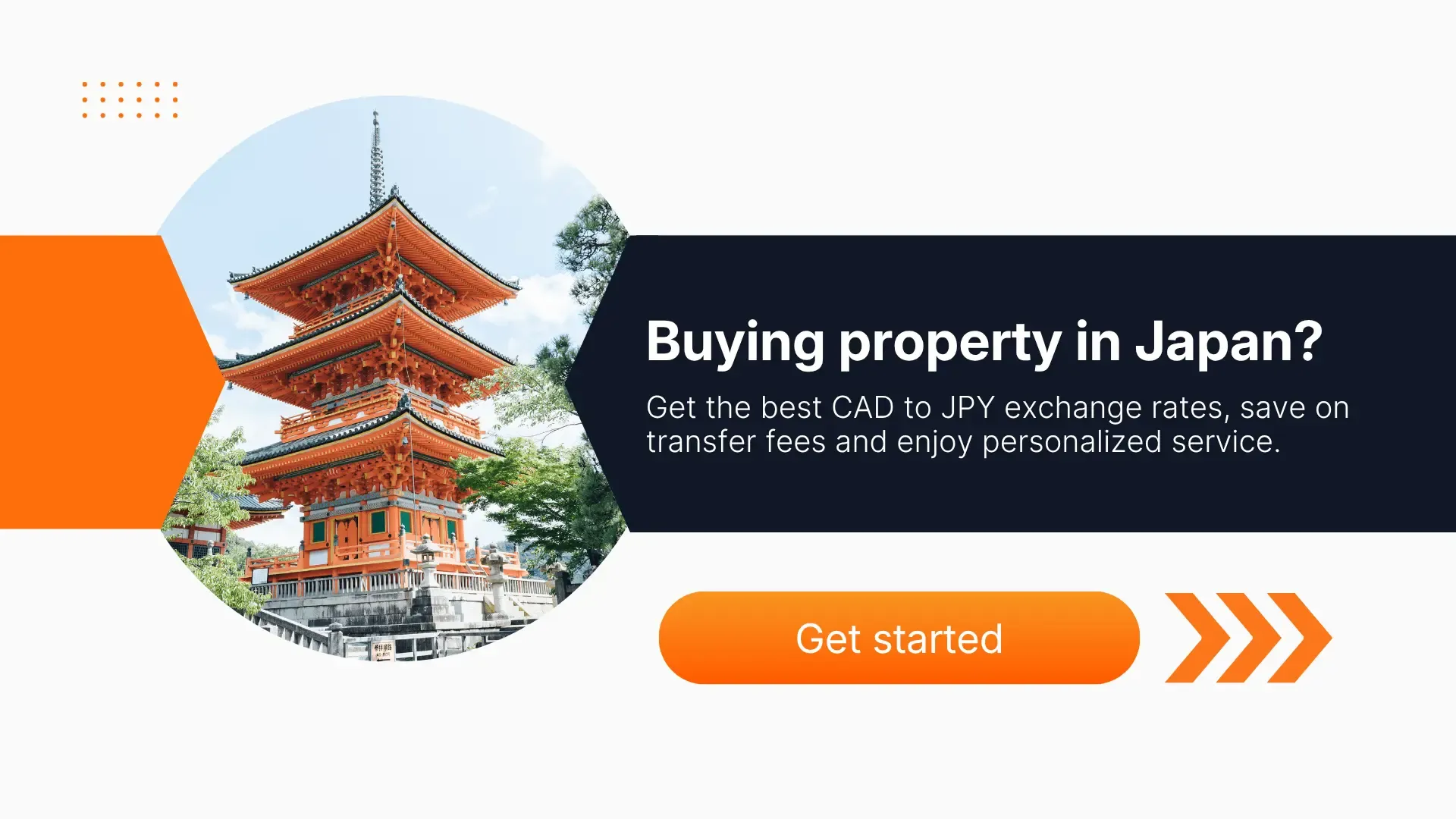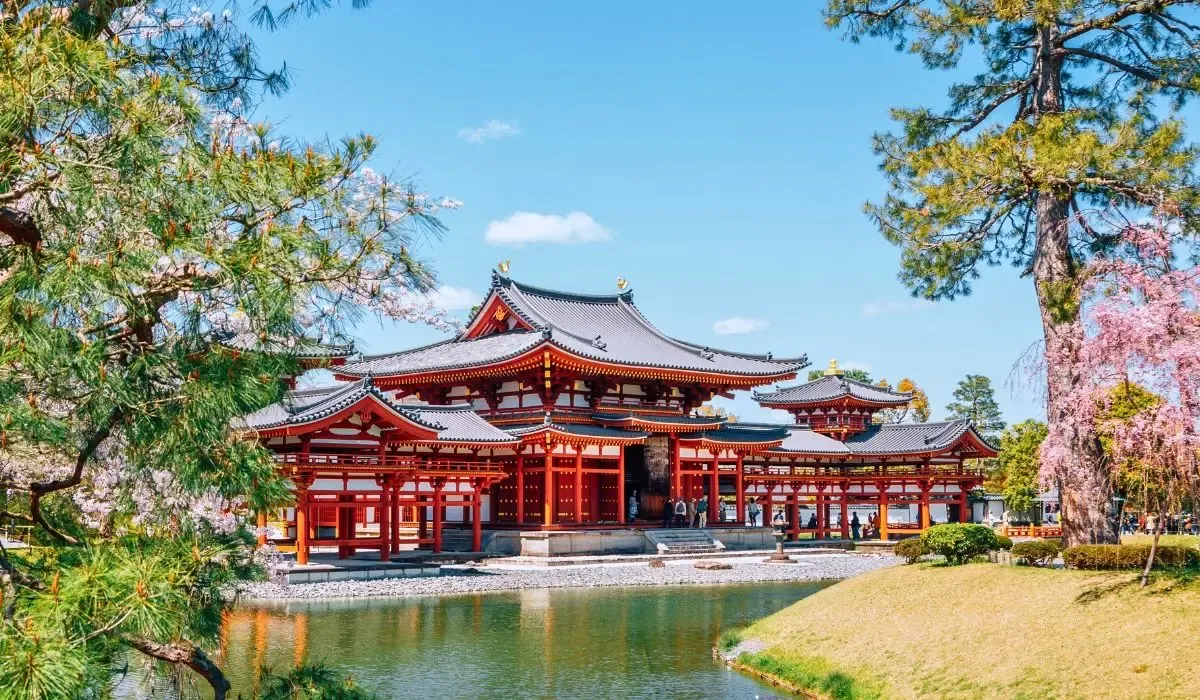Guide for Canadians Buying Property in Japan
Discover how Canadians can confidently buy property in Japan with full ownership rights and no residency restrictions. This guide covers everything from choosing the best areas like Tokyo, Osaka, or Kyoto to understanding the cost of living in Japan vs Canada, essential documents, taxes, and smart ways to transfer funds. Learn how to make your overseas home purchase smooth, secure, and cost-effective with expert insights and MTFX currency solutions.
Japan is where ancient tradition meets futuristic innovation - a country that seamlessly blends timeless beauty with cutting-edge living. For Canadians looking to buy property in Japan, the appeal goes far beyond investment. From Tokyo’s neon skyline and Michelin-star restaurants to the tranquil bamboo groves of Arashiyama and the sacred calm of Nikko’s shrines, it’s easy to see why so many dream of making Japan their home abroad.
Beyond its aesthetics, Japan is consistently ranked among the world’s safest and cleanest countries, making it a top choice for those seeking a secure and comfortable life overseas. Its spirit of hospitality, known as omotenashi, ensures foreigners feel truly welcomed, while world-class public transport, advanced healthcare, and an orderly lifestyle add to its enduring appeal.
The best part? Foreigners can buy property in Japan with full ownership rights, including land. Whether you’re drawn by the idea of a peaceful mountain retreat, a chic city apartment, or a long-term investment in Asia’s most resilient real estate market, this guide walks you through every step to make your Japanese property dream a reality.
Can Canadians buy property in Japan?
Yes, Canadians can buy property in Japan freely, with no special permissions or residency requirements. Japan is one of Asia’s most open and foreigner-friendly real estate markets, allowing full ownership of both land and buildings. This includes everything from modern apartments in major cities to traditional wooden homes and even undeveloped land in scenic areas.
However, while foreigners can legally own property, ownership does not automatically grant residency or long-term stay rights. If your goal is to live in Japan as a Canadian, you’ll need to apply for a visa suited to your situation, such as a work, investor, or business visa. Even so, Japan’s transparent property laws, safe environment, and reliable infrastructure make it an attractive and secure choice for Canadians interested in international homeownership. Therefore, if you are thinking to buy property abroad, Japan is one of the best countries.

Reasons for buying property in Japan as a Canadian
Buying property in Japan as a Canadian offers not only long-term financial security but also lifestyle advantages that go beyond traditional investments. From a stable economy to cultural richness, there are several reasons why Canadians buying property in Japan find it a smart and fulfilling decision.
Stable and transparent real estate market
Japan’s property market is well-regulated and highly transparent, making it easier for foreigners to buy property in Japan without facing ownership restrictions. Unlike some Asian countries, Japan allows full freehold ownership by non-residents, giving Canadians legal confidence and long-term control over their investment. Property values in cities like Tokyo, Fukuoka, and Sapporo tend to remain steady, offering Canadians a hedge against volatility in North American housing markets.
Value for money compared to Canada
While some assume Japan is expensive for Canadian tourists, real estate can actually be more affordable than major Canadian cities. For example, urban condos in Tokyo or Osaka often cost significantly less per square metre than similar properties in Toronto or Vancouver. For Canadians exploring overseas investment, this makes Japan a cost-effective market with potential for rental income and long-term appreciation.
A safe and high-quality living environment
For Canadians planning to live in Japan as a Canadian, safety and quality of life are major advantages. Japan consistently ranks among the safest countries in the world, with clean cities, efficient public services, and low crime rates. This peace of mind, combined with excellent infrastructure, healthcare, and public transport, makes daily life both secure and convenient for expats and retirees.
Cultural connection and lifestyle appeal
Many Canadians are drawn to Japan’s unique blend of tradition and modernity. Owning property allows them to experience local culture beyond tourism—whether it’s participating in community festivals, learning tea ceremony traditions, or exploring seasonal events like cherry blossom season. This deeper cultural connection transforms a purchase into a lifestyle investment, not just a financial one.
Strong rental and tourism opportunities
With Japan’s tourism industry continuing to grow post-pandemic, properties in prime locations like Tokyo, Kyoto, and Okinawa attract steady short-term and long-term rental demand. Canadians who buy property for vacation use or investment can generate income through holiday rentals while enjoying the flexibility of personal use during their visits. The country’s reliable infrastructure and visitor popularity make it a stable market for rental returns.
Seamless integration for Canadians abroad
Canada and Japan share strong bilateral relations, which makes it easier for Canadians to adapt and integrate. Whether you plan to split time between both countries or relocate permanently, the cultural respect, organized systems, and efficient visa options make Japan a practical destination. For snowbirds or remote professionals, living part-time in Japan can provide a rewarding balance between business, culture, and leisure.
For more insights and helpful steps, look for the practical guide for Canadians looking to buy property overseas, which can help you navigate the Japanese market, understand financial considerations like currency exchange, and ensure a smooth property-buying journey abroad.
Best places to buy property in Japan
From modern cityscapes to peaceful rural retreats, Japan offers Canadians a wide range of real estate opportunities. Below are the most desirable locations to consider, each with its own lifestyle, investment, and cultural advantages.
Tokyo
Tokyo remains the economic and cultural powerhouse of Japanese real estate, offering world-class infrastructure and international appeal. For Canadian investors, areas like Minato, Shinjuku, and Meguro deliver reliable capital appreciation and strong rental yields. The market has remained resilient through global downturns, supported by low interest rates and limited land availability.
Professionals relocating from Canada can find everything from sleek high-rise condos to spacious family homes in quieter wards such as Setagaya. Tokyo’s property agents are increasingly bilingual, helping foreign buyers understand Japan’s legal and financing system. For Canadians looking to balance lifestyle and investment, Tokyo offers unmatched convenience, prestige, and long-term security.
Osaka
For Canadians planning to live in Japan, Osaka strikes the ideal balance between affordability and opportunity. Property prices are around 30–40 percent lower than Tokyo’s, while rental returns stay high due to a thriving tourism and manufacturing economy.
Neighbourhoods like Namba and Tennoji are buzzing with restaurants, nightlife, and entertainment, while suburban areas such as Suita and Toyonaka offer quieter, family-friendly living. With its mix of modern comforts and community warmth, Osaka appeals to Canadians seeking both a strong investment and an engaging local lifestyle.
Kyoto
Famous for its heritage sites and cultural depth, Kyoto blends old-world charm with modern amenities. For those wondering if Japan is expensive for Canadian tourists, the city proves that cultural richness doesn’t always come with a high price tag. Outer districts like Fushimi or Yamashina feature affordable traditional homes that can be restored or turned into short-term rentals.
Kyoto’s real estate market is remarkably stable, supported by a steady stream of domestic and international visitors. The city’s clear short-term rental regulations make it easier for Canadians to invest responsibly while enjoying authentic Japanese architecture. Properties here often hold their value due to Kyoto’s heritage-backed demand and limited land availability.
Sapporo
Sapporo is an emerging favourite among Canadians buying a home in Japan who prefer nature, space, and a slower pace of life. The city offers clean air, low population density, and excellent access to nearby ski resorts. Property prices are far lower than Tokyo’s, making it an attractive option for first-time overseas buyers.
The local government has introduced measures to attract foreign investors and promote sustainable urban planning. With vibrant seasonal festivals, fresh local cuisine, and year-round tourism, Sapporo combines lifestyle appeal with solid long-term property value, which is an ideal fit for Canadians seeking balance and affordability.
Niseko
Niseko has earned international fame as Japan’s premier ski destination. The region’s luxury chalets and ski-in/ski-out condos are a top draw for global investors seeking strong seasonal returns. While prices are higher than other regions, rental yields remain consistent due to growing demand from international travellers.
What makes Niseko particularly appealing is its English-friendly ecosystem. Property management, legal services, and hospitality businesses all cater to foreign investors, making transactions straightforward for Canadians. Planned transport upgrades, including a faster rail link from Sapporo, are expected to enhance accessibility and drive further growth.
Okinawa
For buyers seeking cheap houses for sale in Japan’s countryside, Okinawa delivers sun, sand, and affordability. Its mild winters, relaxed pace, and friendly community make it popular among Canadians planning semi-retirement abroad. The cost of living is lower than on the mainland, and properties range from renovated seaside villas to modern apartments.
Tourism in Okinawa continues to expand, creating demand for short-term and vacation rentals. The local government also encourages eco-friendly property projects, which adds long-term value for investors. For Canadians dreaming of tropical living with reliable connectivity, Okinawa offers the perfect balance of lifestyle and investment potential.
What documents do I need when buying property in Japan?
When purchasing property in Japan, having the right documents prepared helps ensure a smooth and legally sound transaction. Whether you plan to buy property in Japan as an investment or to relocate, Canadians should prepare the following key documents before completing the purchase.
1. Proof of identity and residency status
A valid passport is required for all foreigners buying property in Japan. Canadians do not need to be residents to purchase property. Non-residents can legally own homes and land without restrictions. However, having a local address in Japan or appointing a representative can simplify paperwork and communication with real-estate agents, notaries, and legal offices.
2. Registered seal or signature authorization
In Japan, contracts are traditionally signed using a registered seal (inkan or hanko). For Canadians buying a home in Japan, a verified signature is usually acceptable, but if you prefer to use a seal, you’ll need a seal registration certificate issued by a local municipal office. Your real-estate agent or legal representative can guide you on which option is appropriate.
3. Financial and income verification
If you are purchasing the property with your own funds, you’ll need to show proof of funds such as recent bank statements or investment account summaries. These confirm that the funds being transferred from Canada are legitimate and meet Japan’s anti-money-laundering regulations.
If you intend to apply for financing through a Japanese bank, you’ll be required to submit income verification documents such as pay slips and tax returns, although most Japanese lenders only offer mortgages to residents.
4. Property and ownership documents
Before buying land in Japan, you’ll receive several important documents from the seller or agent, including:
- Land and building registration certificate: Confirms ownership history and any liens or mortgages on the property.
- Land survey and zoning documents: Define the property boundaries and permitted land use.
- Property tax assessment records: Verify that there are no unpaid taxes or disputes associated with the property.
These documents protect your rights as a buyer and ensure the property is legally transferable.
5. Sales and purchase agreement
This contract outlines all transaction details, including price, payment schedule, deposit amount, and completion date. For Canadians buying a home in Japan, it’s strongly advised to hire a bilingual real-estate lawyer or certified translator to review the contract before signing. Once signed and the deposit is paid, the agreement becomes legally binding.
6. Registration and tax certificates
After the transaction is completed, you will receive a property registration certificate confirming you as the official owner. You’ll also need a tax payment certificate proving that all property taxes have been settled. These documents are vital for future resale or inheritance purposes.
Tip for Canadian buyers: When buying property in Japan, you’ll likely need to transfer large sums in yen for deposits and closing costs. Using a specialist like MTFX can help you save significantly by offering better CAD to JPY exchange rates and transparent transfer fees. You can use the CAD to JPY chart below to understand the exchange rate trends to make an informed decision.
Step-by-step guide: How to buy property in Japan as a Canadian
For Canadians exploring international real estate, Japan stands out as one of Asia’s most stable and welcoming property markets. The good news is that foreigners can buy property in Japan without restrictions, including full ownership of land and buildings. Below is a detailed, easy-to-follow guide outlining every stage of the process, from research to registration.
Step 1: Understand Japan’s property landscape
Before buying property in Japan, start by researching the housing market and understanding regional differences. Tokyo and Osaka offer higher rental yields and modern amenities, while smaller cities and rural towns provide affordability and lifestyle appeal.
Look beyond price alone - evaluate property appreciation trends, infrastructure development, and population movement. The cost of living in Japan vs Canada is generally lower, particularly outside major cities, allowing Canadians to stretch their investment further while enjoying a comfortable standard of living.
Step 2: Hire a licensed real estate agent
Work with an English-speaking real estate agent experienced in helping overseas buyers. They’ll help you navigate Japanese real estate procedures, from viewing properties to negotiating with sellers. Licensed agents in Japan are regulated and must disclose all transaction details under the Real Estate Business Act, ensuring transparency.
A skilled agent can also advise on neighbourhoods that suit your lifestyle - whether you’re seeking high-end Tokyo houses for sale, beachside homes in Okinawa, or ski chalets in Niseko. Their local expertise helps you identify properties that match both your financial goals and lifestyle preferences.
Step 3: Prepare your legal and financial setup
To streamline the transaction, open a Japanese bank account for deposits and payments. Although it’s not mandatory, having one simplifies fund transfers and utility arrangements once you take ownership.
You’ll also need a personal seal (Inkan) for official documents - Japan’s equivalent of a legal signature. For Canadians, your agent or solicitor can guide you through the registration process. If you plan to finance the purchase, note that mortgages are generally available only to residents, so most non-residents use funds transferred from Canada.
Step 4: Hire a solicitor or judicial scrivener
A solicitor or judicial scrivener plays a vital role in protecting your legal rights when buying a house in Japan. They’ll verify property ownership, check for unpaid taxes or encumbrances, and ensure compliance with Japanese property law.
This professional also manages the ownership transfer at the Legal Affairs Bureau, so your title is correctly registered under your name. It’s strongly recommended to work with bilingual legal experts who can explain complex terms and documentation in plain English.
Step 5: View and inspect properties in person
Whenever possible, visit shortlisted properties before committing. Japan’s homes range from ultra-modern apartments to centuries-old wooden houses, so a thorough inspection is essential. A professional building survey can uncover structural issues, earthquake resistance ratings, and renovation needs that may affect long-term value.
If you’re exploring the countryside or smaller towns, you’ll also find many Tokyo houses for sale equivalents at a fraction of the price, especially in rural prefectures where traditional homes are available for renovation or vacation use. For Canadians seeking a lifestyle change, these areas offer both character and affordability.
Step 6: Make an offer and sign the purchase contract
Once you’ve chosen a property, your agent will submit an offer to the seller. After acceptance, both parties sign the purchase agreement in the presence of your legal advisor. A deposit of around 10% of the total price is typically required at this stage.
Japanese contracts are binding once signed, so review every clause carefully. If you’re buying remotely, digital signing options and international bank transfers make the process straightforward, but always ensure your solicitor verifies each document before submission.
Step 7: Transfer payment and register ownership
The final stage is the property settlement. Pay the remaining balance, and your solicitor will complete the title transfer at the Legal Affairs Bureau. You’ll then receive an official registration certificate confirming your ownership.
When transferring large amounts of money from Canada, use a regulated currency provider to avoid costly markups. Services like MTFX help Canadians send funds in yen efficiently and at competitive rates, ideal when securing international property deals. Check the live CAD to JPY rates with the converter below, or reach out to MTFX for an exact quote based on your transfer amount.
Step 8: Plan for taxes, utilities, and ongoing costs
Owning property in Japan comes with ongoing responsibilities such as property taxes, insurance, and utility setup. According to the Japan External Trade Organization (JETRO), property owners are required to pay two main annual taxes: the fixed asset tax, generally levied at 1.4 percent of the assessed value, and the city planning tax, levied at up to 0.3 percent in designated urban areas.
These rates are confirmed by municipal sources such as the Tokyo Metropolitan Government and Kanazawa City Government, which outline the same standard tax percentages for land and buildings. Utility costs and maintenance fees vary depending on property type, size, and location, with condominium management fees and repairs typically billed monthly.
While Japan’s real-estate market is stable, resale values depend largely on location and property upkeep. Canadians who intend to rent out or reside in their property full-time benefit from reliable public infrastructure, low crime rates, and Japan’s cultural emphasis on maintenance and cleanliness, all of which help preserve long-term value.
Final tip for Canadians: Japan’s open property laws and efficient systems make it one of the easiest Asian countries to buy in as a foreigner. Combine careful research with local expertise, and you’ll discover a market that balances lifestyle, security, and investment growth - all within easy reach from Canada.

Make your dream to buy property in Japan easier with MTFX
When you’re ready to buy property in Japan, handling your international payments efficiently can make a big difference in your overall investment cost. MTFX helps Canadian buyers streamline their cross-border payments with transparent pricing, faster delivery times, and better exchange rates than traditional banks. Here are the reasons why property buyers in Japan choose MTFX
- Bank-beating CAD to JPY exchange rates: Get near mid-market rates when transferring large amounts for deposits, closing costs, or renovations. Even a small rate difference can save thousands when buying a house in Japan.
- Fast, secure transfers: Send your funds directly to Japanese bank accounts with full transparency and security. MTFX ensures every payment complies with FINTRAC and Japanese banking regulations.
- No hidden markups or fees: Unlike traditional banks that charge hidden conversion margins, MTFX provides upfront pricing so you know exactly what you’re paying.
- FX tools designed for real estate buyers: Access live exchange rates, rate alerts, and historical charts to help time your transfers strategically. You can even lock in favourable rates when planning future payments in the Japanese real estate market.
- Expert guidance and dedicated support: Work with a team that understands the property buying process in Japan and can guide you on how to move your funds safely, efficiently, and at the lowest cost possible.
Simplify your Japanese property purchase with MTFX
When transferring large sums to buy property in Japan, every exchange rate point matters. MTFX helps Canadians move money efficiently, securely, and at better rates than traditional banks, so you can focus on your new home, not hidden fees. From deposits and renovations to final settlements, MTFX ensures your yen payments arrive on time and in full.
Experience expert FX support for overseas property buyers, trusted by Canadians worldwide. Compare CAD to JPY rates and enjoy bank-beating rates. Create an account today and get all the support you want to transfer money to Japan.
FAQs
1. How do I send money to Japan for a property purchase?
Use MTFX to convert CAD to JPY and transfer securely to a designated recipient in Japan. You’ll benefit from competitive rates and lower fees compared to traditional banks.
2. Can I send staged payments like a deposit and closing balance?
MTFX supports scheduled and milestone-based JPY transfers for property deals. This flexibility helps manage cash flow and align payments with contractual obligations.
3. Is it safe to transfer large amounts to Japan through MTFX?
MTFX uses encrypted systems, regulatory compliance, and full tracking for all transfers. Your funds are protected, ensuring peace of mind for significant real estate transactions.
4. How long do international transfers to Japan take?
CAD to JPY transfers via MTFX usually settle within 1–2 business days. Processing times can vary slightly depending on receiving bank policies in Japan.
5. What is the current CAD to JPY exchange rate?
View live exchange rates or use the MTFX calculator for up-to-date conversions. This transparency ensures you know precisely how much you’re sending and receiving.
6. Can I monitor exchange rates to time my property payment?
Sign up for rate alerts and optimize your transfer timing for better value. This tool helps you capitalize on favorable market movements when buying property.
7. Can I repatriate funds to Canada if I sell my Japanese property?
MTFX supports compliant JPY to CAD transfers post-sale of your property. This makes it easy to bring your proceeds home safely and cost-effectively.
8. Can I use MTFX to pay for property-related expenses like renovations?
MTFX supports one-time and recurring JPY payments for renovations or fees. It’s a convenient way to handle all costs tied to property ownership in Japan.
9. Does MTFX offer better value than Canadian banks?
MTFX provides better exchange rates, lower fees, and faster transfers. This can save significant costs, especially on large real estate transactions.
10. Is MTFX suitable for high-value international real estate deals?
Absolutely. MTFX is designed for secure, large money transfers. It’s trusted for handling substantial property purchases with full transparency and security.
Sources
https://www.tax.metro.tokyo.lg.jp/documents/d/tax/guidebook2022e
https://www.jetro.go.jp/en/invest/setting_up/section3/page8.html
https://www4.city.kanazawa.lg.jp/material/files/group/6/23FixedAssetTaxGuide.pdf
Related Blogs
Stay ahead with fresh perspectives, expert tips, and inspiring stories.

Keep updated
Make informed decisions
Access tools to help you track, manage, and simplify your global payments.
Currency market updates
Track key currency movements and plan your transfers with confidence.
Create an account today
Start today, and let us take the hassle out of overseas transfers.




